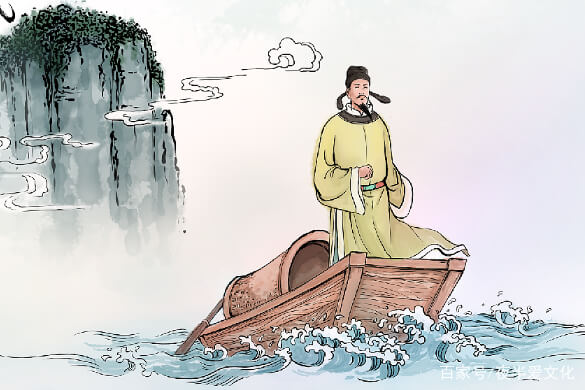Early Departure from Baidi City
- Poetry of Li Bai (Li Po)

At dawn I left Baidi enwrapped in clouds aglow,
A thousand miles to Jiangling, takes only a day to go.
In the endless cries of monkeys from banks both left and right,
I’ve skiffed past myriads of mountains flanking me high or low.
*li – ancient measure of length, approximately 500 meters
In 755 AD, a rebellion against the government led to the abdication of Emperor Xuanzong. Li Bai, a renowned poet at the time, sided with Prince Lin, the emperor’s 16th son, who fought for the throne. However, after Lin was defeated and executed, Li Bai was exiled to Yelang. A year later, when Emperor Xuanzong died, Li Bai was pardoned. Thus, Li Bai wrote this poem when he was sailing back home on the Yangtze River, finally released from his exile.
The tone of this poem is carefree and optimistic, depicting Li Bai’s happiness as he departs from his place of exile.
Whereas clouds are typically gray and represent a rainy or foggy day, the imagery of rosy clouds at dawn sets a glowing and beautiful atmosphere. The juxtaposition of the words “千” (thousand) and “一” (one) also reveals Li Bai’s enthusiasm: instead of focusing on on the thousands of meters it will take to reach his destination, he emphasizes the short length of time it will take for him to return. Furthermore, the apes, which signify his adversaries, call out endlessly and attempt to stop him on his path back home; however, he appears unaffected by the chaos and noise — his light boat easily passes through the two shores. The term “轻” not only signifies the lightness of his boat, but also represents his light-hearted feelings as he leaves behind the ten-thousand layers of mountains, the burdens of his past.
朝辞白帝彩云间,千里江陵一日还。
两岸猿声啼不住,轻舟已过万重山。
- Why Chinese poems is so special?
- The most distinctive features of Chinese poetry are: concision- many poems are only four lines, and few are much longer than eight; ambiguity- number, tense and parts of speech are often undetermined, creating particularly rich interpretative possibilities; and structure- most poems follow quite strict formal patterns which have beauty in themselves as well as highlighting meaningful contrasts.
- How to read a Chinese poem?
- Like an English poem, but more so. Everything is there for a reason, so try to find that reason. Think about all the possible connotations, and be aware of the different possibilities of number and tense. Look for contrasts: within lines, between the lines of each couplet and between successive couplets. Above all, don't worry about what the poet meant- find your meaning.